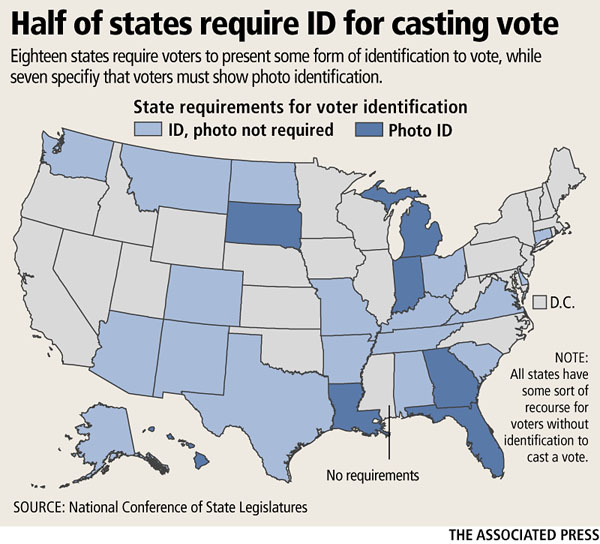Court: Photo ID can be required
WASHINGTON -- The Supreme Court ruled Monday that states can require voters to produce photo identification without violating their constitutional rights, validating Republican-inspired voter ID laws.
In a splintered 6-3 ruling, the court upheld Indiana's strict photo ID requirement, which Democrats and civil rights groups said would deter poor, older and minority voters from casting ballots. Its backers said it was needed to prevent fraud.
It was the most important voting rights case since the Bush v. Gore dispute that sealed the 2000 election for George W. Bush. But the voter ID ruling lacked the conservative-liberal split that marked the 2000 case.
The law "is amply justified by the valid interest in protecting 'the integrity and reliability of the electoral process,'" Justice John Paul Stevens said in an opinion that was joined by Chief Justice John Roberts and Anthony Kennedy. Stevens was a dissenter in Bush v. Gore in 2000.
Justices Samuel Alito, Antonin Scalia and Clarence Thomas also agreed with the outcome, but wrote separately.
Justices Stephen Breyer, Ruth Bader Ginsburg and David Souter dissented, just as they did in 2000.
More than 20 states require some form of identification at the polls. Courts have upheld voter ID laws in Arizona, Georgia and Michigan, but struck down Missouri's. Monday's decision comes a week before Indiana's presidential primary.
The decision also could spur efforts to pass similar laws in other states.
There is no general voter identification requirement in Nevada law currently. Nevada now only requires the presentation of a valid ID when a person registers to vote. It does not have to be a picture ID.
A bill requiring a picture ID to vote in Nevada passed the Senate Legislative Affairs and Operations Committee on a party line 4-3 vote in 2007, but it never came up for a vote in the full Senate.
Sen. Bob Beers, R-Las Vegas, one of the co-sponsors of the measure, said he probably will pursue the issue again in the 2009 session if he wins reelection this year.
But there has been general opposition to such a measure in the Assembly, where Democrats hold a majority, he said.
"I am unimpressed with the argument last session that somehow this discriminates against citizens," Beers said. "A voter ID protects not only against voting by illegal residents, it protects against fraudulent voting as well."
Ken Falk, legal director of the American Civil Liberties Union of Indiana, said he hadn't reviewed the decision, but he was "extremely disappointed" by it. Falk has said voter ID laws inhibit voting, and a person's right to vote "is the most important right." The ACLU brought the case on behalf of Indiana voters.
The case before the nation's highest court concerned a state law, passed in 2005, that was backed by Republicans as a way to deter voter fraud. Democrats and civil rights groups opposed the law as unconstitutional and called it a thinly veiled effort to discourage older, poor and minority voters, or those most likely to lack proper ID and who tend to vote for Democrats.
There is little history in Indiana of either in-person voter fraud, of the sort the law was designed to thwart, or voters being inconvenienced by the law's requirements. For the overwhelming majority of voters, an Indiana driver license serves as the identification.
"We cannot conclude that the statute imposes 'excessively burdensome requirements' on any class of voters," Stevens said.
Stevens' opinion suggests the outcome could be different in a state where voters could provide evidence that their rights had been impaired.
But in dissent, Souter said Indiana's voter ID law "threatens to impose nontrivial burdens on the voting rights of tens of thousands of the state's citizens."
The Review-Journal contributed to this report.

















